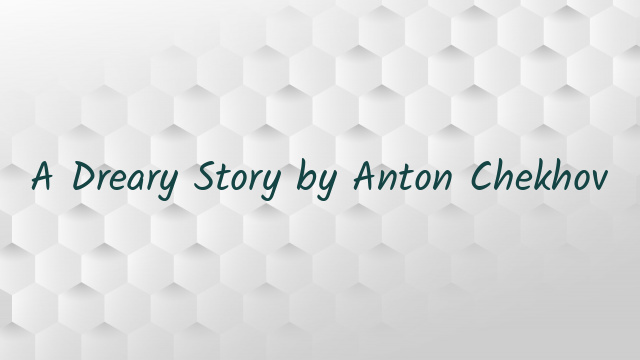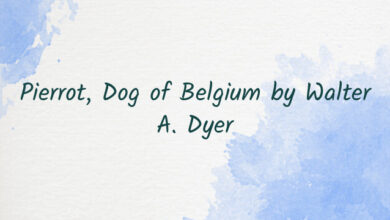
A Dreary Story by Anton Chekhov
Chapter 4
Summer comes on and life is changed.
One fine morning Liza comes in to me and says in a jesting tone:
“Come, your Excellency! We are ready.”
My Excellency is conducted into the street, and seated in a cab. As I go along, having nothing to do, I read the signboards from right to left. The word “Traktir” reads ” Ritkart”; that would just suit some baron’s family: Baroness Ritkart. Farther on I drive through fields, by the graveyard, which makes absolutely no impression on me, though I shall soon lie in it; then I drive by forests and again by fields. There is nothing of interest. After two hours of driving, my Excellency is conducted into the lower storey of a summer villa and installed in a small, very cheerful little room with light blue hangings.
At night there is sleeplessness as before, but in the morning I do not put a good face upon it and listen to my wife, but lie in bed. I do not sleep, but lie in the drowsy, half-conscious condition in which you know you are not asleep, but dreaming. At midday I get up and from habit sit down at my table, but I do not work now; I amuse myself with French books in yellow covers, sent me by Katya. Of course, it would be more patriotic to read Russian authors, but I must confess I cherish no particular liking for them. With the exception of two or three of the older writers, all our literature of today strikes me as not being literature, but a special sort of home industry, which exists simply in order to be encouraged, though people do not readily make use of its products. The very best of these home products cannot be called remarkable and cannot be sincerely praised without qualification. I must say the same of all the literary novelties I have read during the last ten or fifteen years; not one of them is remarkable, and not one of them can be praised without a “but.” Cleverness, a good tone, but no talent; talent, a good tone, but no cleverness; or talent, cleverness, but not a good tone.
I don’t say the French books have talent, cleverness, and a good tone. They don’t satisfy me, either. But they are not so tedious as the Russian, and it is not unusual to find in them the chief element of artistic creation — the feeling of personal freedom which is lacking in the Russian authors. I don’t remember one new book in which the author does not try from the first page to entangle himself in all sorts of conditions and contracts with his conscience. One is afraid to speak of the naked body; another ties himself up hand and foot in psychological analysis; a third must have a “warm attitude to man”; a fourth purposely scrawls whole descriptions of nature that he may not be suspected of writing with a purpose. . . . One is bent upon being middle-class in his work, another must be a nobleman, and so on. There is intentionalness, circumspection, and self-will, but they have neither the independence nor the manliness to write as they like, and therefore there is no creativeness.
All this applies to what is called belles-lettres.
As for serious treatises in Russian on sociology, for instance, on art, and so on, I do not rea d them simply from timidity. In my childhood and early youth I had for some reason a terror of doorkeepers and attendants at the theatre, and that terror has remained with me to this day. I am afraid of them even now. It is said that we are only afraid of what we do not understand. And, indeed, it is very difficult to understand why doorkeepers and theatre attendants are so dignified, haughty, and majestically rude. I feel exactly the same terror when I read serious articles. Their extraordinary dignity, their bantering lordly tone, their familiar manner to foreign authors, their ability to split straws with dignity — all that is beyond my understanding; it is intimidating and utterly unlike the quiet, gentlemanly tone to which I am accustomed when I read the works of our medical and scientific writers. It oppresses me to read not only the articles written by serious Russians, but even works translated or edited by them. The pretentious, edifying tone of the preface; the redundancy of remarks made by the translator, which prevent me from concentrating my attention; the question marks and “sic” in parenthesis scattered all over the book or article by the liberal translator, are to my mind an outrage on the author and on my independence as a reader.
Once I was summoned as an expert to a circuit court; in an interval one of my fellow-experts drew my attention to the rudeness of the public prosecutor to the defendants, among whom there were two ladies of good education. I believe I did not exaggerate at all when I told him that the prosecutor s manner was no ruder than that of the authors of serious articles to one another. Their manners are, indeed, so rude that I cannot speak of them without distaste. They treat one another and the writers they criticize either with superfluous respect, at the sacrifice of their own dignity, or, on the contrary, with far more ruthlessness than I have shown in my notes and my thoughts in regard to my future son-in-law Gnekker. Accusations of irrationality, of evil intentions, and, indeed, of every sort of crime, form an habitual ornament of serious articles. And that, as young medical men are fond of saying in their monographs, is the ultima ratio! Such ways must infallibly have an effect on the morals of the younger generation of writers, and so I am not at all surprised that in the new works with which our literature has been enriched during the last ten or fifteen years the heroes drink too much vodka and the heroines are not over-chaste.
I read French books, and I look out of the window which is open; I can see the spikes of my garden-fence, two or three scraggy trees, and beyond the fence the road, the fields, and beyond them a broad stretch of pine-wood. Often I admire a boy and girl, both flaxen-headed and ragged, who clamber on the fence and laugh at my baldness. In their shining little eyes I read, “Go up, go up, thou baldhead!” They are almost the only people who care nothing for my celebrity or my rank.
Visitors do not come to me every day now. I will only mention the visits of Nikolay and Pyotr Ignatyevitch. Nikolay usually comes to me on holidays, with some pretext of business, though really to see me. He arrives very much exhilarated, a thing which never occurs to him in the winter.
“What have you to tell me?” I ask, going out to him in the hall.
“Your Excellency!” he says, pressing his hand to his heart and looking at me with the ecstasy of a lover — “your Excellency! God be my witness! Strike me dead on the spot! Gaudeamus egitur juventus!”
And he greedily kisses me on the shoulder, on the sleeve, and on the buttons.
“Is everything going well?” I ask him.
“Your Excellency! So help me God! . . .”
He persists in grovelling before me for no sort of reason, and soon bores me, so I send him away to the kitchen, where they give him dinner.
Pyotr Ignatyevitch comes to see me on holidays, too, with the special object of seeing me and sharing his thoughts with me. He usually sits down near my table, modest, neat, and reasonable, and does not venture to cross his legs or put his elbows on the table. All the time, in a soft, even, little voice, in rounded bookish phrases, he tells me various, to his mind, very interesting and piquant items of news which he has read in the magazines and journals. They are all alike and may be reduced to this type: “A Frenchman has made a discovery; some one else, a German, has denounced him, proving that the discovery was made in 1870 by some American; while a third person, also a German, trumps them both by proving they both had made fools of themselves, mistaking bubbles of air for dark pigment under the microscope. Even when he wants to amuse me, Pyotr Ignatyevitch tells me things in the same lengthy, circumstantial manner as though he were defending a thesis, enumerating in detail the literary sources from which he is deriving his narrative, doing his utmost to be accurate as to the date and number of the journals and the name of every one concerned, invariably mentioning it in full — Jean Jacques Petit, never simply Petit. Sometimes he stays to dinner with us, and then during the whole of dinner-time he goes on telling me the same sort of piquant anecdotes, reducing every one at table to a state of dejected boredom. If Gnekker and Liza begin talking before him of fugues and counterpoint, Brahms and Bach, he drops his eyes modestly, and is overcome with embarrassment; he is ashamed that such trivial subjects should be discussed before such serious people as him and me.
In my present state of mind five minutes of him is enough to sicken me as though I had been seeing and hearing him for an eternity. I hate the poor fellow. His soft, smooth voice and bookish language exhaust me, and his stories stupefy me. . . . He cherishes the best of feelings for me, and talks to me simply in order to give me pleasure, and I repay him by looking at him as though I wanted to hypnotize him, and think, “Go, go, go! . . .” But he is not amenable to thought-suggestion, and sits on and on and on. . . .
While he is with me I can never shake off the thought, “It’s possible when I die he will be appointed to succeed me,” and my poor lecture-hall presents itself to me as an oasis in which the spring is died up; and I am ungracious, silent, and surly with Pyotr Ignatyevitch, as though he were to blame for such thoughts, and not I myself. When he begins, as usual, praising up the German savants, instead of making fun of him good-humouredly, as I used to do, I mutter sullenly:
“Asses, your Germans! . . .”
That is like the late Professor Nikita Krylov, who once, when he was bathing with Pirogov at Revel and vexed at the water’s being very cold, burst out with, “Scoundrels, these Germans!” I behave badly with Pyotr Ignatyevitch, and only when he is going away, and from the window I catch a glimpse of his grey hat behind the garden-fence, I want to call out and say, “Forgive me, my dear fellow!”
Dinner is even drearier than in the winter. Gnekker, whom now I hate and despise, dines with us almost every day. I used to endure his presence in silence, now I aim biting remarks at him which make my wife and daughter blush. Carried away by evil feeling, I often say things that are simply stupid, and I don’t know why I say them. So on one occasion it happened that I stared a long time at Gnekker, and, a propos of nothing, I fired off:
“An eagle may perchance swoop down below a cock, But never will the fowl soar upwards to the clouds. . And the most vexatious thing is that the fowl Gnekker shows himself much cleverer than the eagle professor. Knowing that my wife and daughter are on his side, he takes up the line of meeting my gibes with condescending silence, as though to say:
“The old chap is in his dotage; what’s the use of talking to him?”
Or he makes fun of me good-naturedly. It is wonderful how petty a man may become! I am capable of dreaming all dinner-time of how Gnekker will turn out to be an adventurer, how my wife and Liza will come to see their mistake, and how I will taunt them — and such absurd thoughts at the time when I am standing with one foot in th e grave!
There are now, too, misunderstandings of which in the old days I had no idea except from hearsay. Though I am ashamed of it, I will describe one that occurred the other day after dinner.
I was sitting in my room smoking a pipe; my wife came in as usual, sat down, and began saying what a good thing it would be for me to go to Harkov now while it is warm and I have free time, and there find out what sort of person our Gnekker is.
“Very good; I will go,” I assented.
My wife, pleased with me, got up and was going to the door, but turned back and said:
“By the way, I have another favour to ask of you. I know you will be angry, but it is my duty to warn you. . . . Forgive my saying it, Nikolay Stepanovitch, but all our neighbours and acquaintances have begun talking about your being so often at Katya’s. She is clever and well-educated; I don’t deny that her company may be agreeable; but at your age and with your social position it seems strange that you should find pleasure in her society. . . . Besides, she has such a reputation that . . .”
All the blood suddenly rushed to my brain, my eyes flashed fire, I leaped up and, clutching at my head and stamping my feet, shouted in a voice unlike my own:
“Let me alone! let me alone! let me alone!”
Probably my face was terrible, my voice was strange, for my wife suddenly turned pale and began shrieking aloud in a despairing voice that was utterly unlike her own. Liza, Gnekker, then Yegor, came running in at our shouts. . . .
“Let me alone!” I cried; “let me alone! Go away!”
My legs turned numb as though they had ceased to exist; I felt myself falling into someone’s arms; for a little while I still heard weeping, then sank into a swoon which lasted two or three hours.
Now about Katya; she comes to see me every day towards evening, and of course neither the neighbours nor our acquaintances can avoid noticing it. She comes in for a minute and carries me off for a drive with her. She has her own horse and a new chaise bought this summer. Altogether she lives in an expensive style; she has taken a big detached villa with a large garden, and has taken all her town retinue with her — two maids, a coachman . . . I often ask her:
“Katya, what will you live on when you have spent your father’s money?”
“Then we shall see,” she answers.
“That money, my dear, deserves to be treated more seriously. It was earned by a good man, by honest labour.”
“You have told me that already. I know it.”
At first we drive through the open country, then through the pine-wood which is visible from my window. Nature seems to me as beautiful as it always has been, though some evil spirit whispers to me that these pines and fir trees, birds, and white clouds on the sky, will not notice my absence when in three or four months I am dead. Katya loves driving, and she is pleased that it is fine weather and that I am sitting beside her. She is in good spirits and does not say harsh things.
“You are a very good man, Nikolay Stepanovitch,” she says. “You are a rare specimen, and there isn’t an actor who would understand how to play you. Me or Mihail Fyodorovitch, for instance, any poor actor could do, but not you. And I envy you, I envy you horribly! Do you know what I stand for? What?”
She ponders for a minute, and then asks me:
“Nikolay Stepanovitch, I am a negative phenomenon! Yes?”
“Yes,” I answer.
“H’m! what am I to do?”
What answer was I to make her? It is easy to say “work,” or “give your possessions to the poor,” or “know yourself,” and because it is so easy to say that, I don’t know what to answer.
My colleagues when they teach therapeutics advise “the individual study of each separate case.” One has but to obey this advice to gain the conviction that the methods recommended in the textbooks as the best and as providing a safe basis for treatment turn out to be quite unsuitable in individual cases. It is just the same in moral ailments.
But I must make some answer, and I say:
“You have too much free time, my dear; you absolutely must take up some occupation. After all, why shouldn’t you be an actress again if it is your vocation?”
“I cannot!”
“Your tone and manner suggest that you are a victim. I don’t like that, my dear; it is your own fault. Remember, you began with falling out with people and methods, but you have done nothing to make either better. You did not struggle with evil, but were cast down by it, and you are not the victim of the struggle, but of your own impotence. Well, of course you were young and inexperienced then; now it may all be different. Yes, really, go on the stage. You will work, you will serve a sacred art.”
“Don’t pretend, Nikolay Stepanovitch,” Katya interrupts me. “Let us make a compact once for all; we will talk about actors, actresses, and authors, but we will let art alone. You are a splendid and rare person, but you don’t know enough about art sincerely to think it sacred. You have no instinct or feeling for art. You have been hard at work all your life, and have not had time to acquire that feeling. Altogether . . . I don’t like talk about art,” she goes on nervously. “I don’t like it! And, my goodness, how they have vulgarized it!”
“Who has vulgarized it?”
“They have vulgarized it by drunkenness, the newspapers by their familiar attitude, clever people by philosophy.”
“Philosophy has nothing to do with it.”
“Yes, it has. If any one philosophizes about it, it shows he does not understand it.”
To avoid bitterness I hasten to change the subject, and then sit a long time silent. Only when we are driving out of the wood and turning towards Katya’s villa I go back to my former question, and say:
“You have still not answered me, why you don’t want to go on the stage.”
“Nikolay Stepanovitch, this is cruel!” she cries, and suddenly flushes all over. “You want me to tell you the truth aloud? Very well, if . . . if you like it! I have no talent! No talent and . . . and a great deal of vanity! So there!”
After making this confession she turns her face away from me, and to hide the trembling of her hands tugs violently at the reins.
As we are driving towards her villa we see Mihail Fyodorovitch walking near the gate, impatiently awaiting us.
“That Mihail Fyodorovitch again!” says Katya with vexation. “Do rid me of him, please! I am sick and tired of him . . . bother him!”
Mihail Fyodorovitch ought to have gone abroad long ago, but he puts off going from week to. week. Of late there have been certain changes in him. He looks, as it were, sunken, has taken to drinking until he is tipsy, a thing which never used to happen to him, and his black eyebrows are beginning to turn grey. When our chaise stops at the gate he does not conceal his joy and his impatience. He fussily helps me and Katya out, hurriedly asks questions, laughs, rubs his hands, and that gentle, imploring, pure expression, which I used to notice only in his eyes, is now suffused all over his face. He is glad and at the same time he is ashamed of his gladness, ashamed of his habit of spending every evening with Katya. And he thinks it necessary to explain his visit by some obvious absurdity such as: “I was driving by, and I thought I would just look in for a minute.”
We all three go indoors; first we drink tea, then the familiar packs of cards, the big piece of cheese, the fruit, and the bottle of Crimean champagne are put upon the table. The subjects of our conversation are not new; they are just the same as in the winter. We fall foul of the University, the students, and literature and the theatre; the air grows thick and stifling with evil speaking, and poisoned by the breath, not of two toads as in the winter, but of three. Besides the velvety baritone laugh and the giggle like the gasp of a concertina, the maid who waits upon us hears an unpleasant cracked “He, he!” like the chuckle of a general in a vaudeville.




